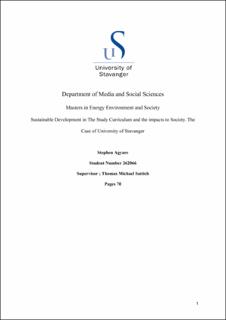| dc.description.abstract | Also known as the “PetroCapital” of Norway, Stavanger is famous for having a buoyant and well established ecosystem in the oil and gas industry. The University of Stavanger is regarded as a key player in the innovation ecosystem and contributes immensely to supplying skilled human resources to the innovation ecosystem. In recent years, the calls for green transition has resulted in a change in the dynamics of the “traditional” oil and gas ecosystem. The University of Stavanger responds to these calls by integrating Sustainable Development into the study curriculum. Through Discourse Tracing, this study examines whether the decision to integrate Sustainable Development in the study curriculum came from Macro, Meso or Micro levels of society. The Multi Level Perspective combined with the Pragmatist Didactic approach provides theoretical underpinnings to this study.
Findings show that there is a strong level of influence on the University at all the levels (Macro,Meso,Micro) , establishing that all units in the innovation ecosystem work together to influence Sustainable development in the current study curriculum at the University of Stavanger. | |
